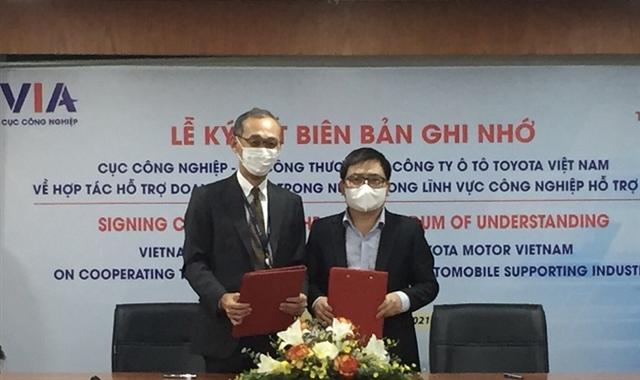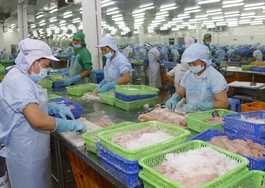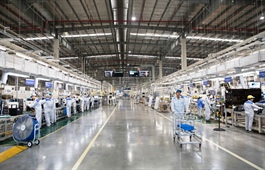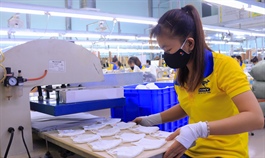Toyota supports Vietnam manufacturing auto parts
Toyota supports Vietnam manufacturing auto parts
The formation of local supply chains remains core for Vietnam’s sustainable industrial sector in the future, said a local senior official.
Toyota Vietnam would join hands with the Ministry of Industry and Trade (MoIT) in supporting local auto part manufacturers, with the aim of enhancing their competitiveness to join global supply chains.

Overview of the signing ceremony. Photo: Kinhtedothi
|
The move was revealed in a recent signing ceremony of the memorandum of understanding (MoU) between the two sides to promote the development of local automobile supporting industries.
A key step in this process is to help Vietnamese auto part manufacturers boost production capabilities and form a linkage with other automobile assemblers.
Under the MoU, Toyota would help screen potential manufacturers of car parts from a list provided by the MoIT and refer them to car producers/assemblers, as well as providing training.
Pham Tuan Anh, vice director of the Industry Department under the MoIT, said the lack of linkage between Vietnamese enterprises and their foreign peers not only affects product development and economic growth in short-term, but also creates long-term problems.
“The development of supporting industries and boosting linkage between local and foreign enterprises is a strategy for long-term growth, while the formation of local supply chains remains core for Vietnam’s sustainable industrial sector in the future,” said Tuan Anh.
General Director of Toyota Vietnam Hiroyuki Ueda noted Vietnam’s supporting industries hold a major advantage in high-quality human resources but with low labor costs.
However, Ueda pointed out the current shortcomings of local enterprises, which is their inability to produce products in mass quantity and of consistent quality.
“The lack of an industry to produce high-quality industrial materials also leads to the import of input materials,” he added, not to mention limited corporate governance capabilities that are causing production costs at two or three-fold higher than regional countries.
In 2020, the MoIT and Toyota jointly conducted a survey and selected 200 potential suppliers. Among them, six received further consultation from Toyota and put into the list of the supply chains for the Japanese car manufacturer.
Hanoi Plastic Company after one year working with Toyota has saved around VND2.8 billion (US$122,000) in operational costs by optimizing the production chain and improved producitivity by 10%. LeGroup has also been benefitted from the process with labor productivity raising from 80% to 93% and saved over 500 square meter of production space.























